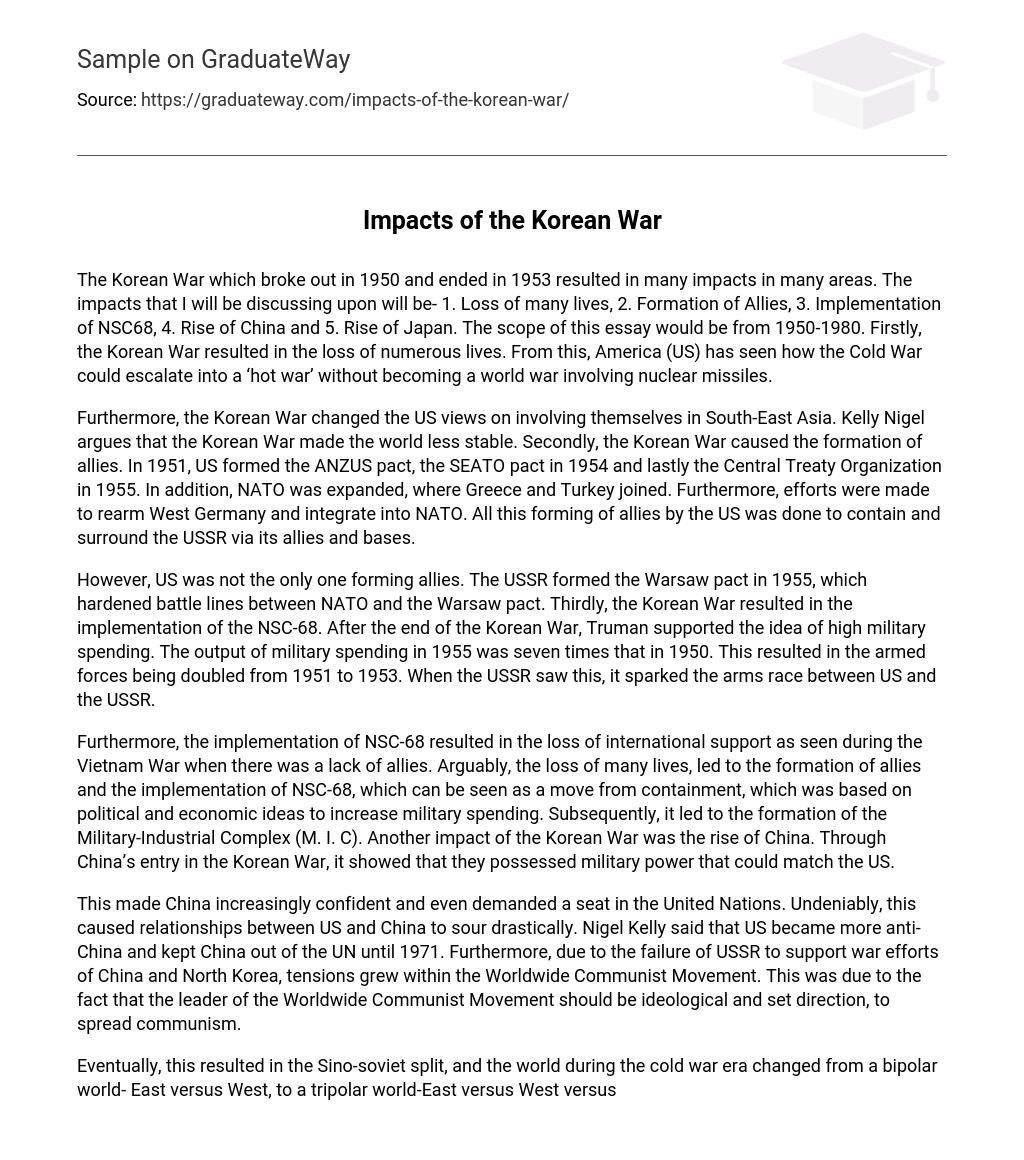The Korean War which broke out in 1950 and ended in 1953 resulted in many impacts in many areas. The impacts that I will be discussing upon will be- 1. Loss of many lives, 2. Formation of Allies, 3. Implementation of NSC68, 4. Rise of China and 5. Rise of Japan. The scope of this essay would be from 1950-1980. Firstly, the Korean War resulted in the loss of numerous lives. From this, America (US) has seen how the Cold War could escalate into a ‘hot war’ without becoming a world war involving nuclear missiles.
Furthermore, the Korean War changed the US views on involving themselves in South-East Asia. Kelly Nigel argues that the Korean War made the world less stable. Secondly, the Korean War caused the formation of allies. In 1951, US formed the ANZUS pact, the SEATO pact in 1954 and lastly the Central Treaty Organization in 1955. In addition, NATO was expanded, where Greece and Turkey joined. Furthermore, efforts were made to rearm West Germany and integrate into NATO. All this forming of allies by the US was done to contain and surround the USSR via its allies and bases.
However, US was not the only one forming allies. The USSR formed the Warsaw pact in 1955, which hardened battle lines between NATO and the Warsaw pact. Thirdly, the Korean War resulted in the implementation of the NSC-68. After the end of the Korean War, Truman supported the idea of high military spending. The output of military spending in 1955 was seven times that in 1950. This resulted in the armed forces being doubled from 1951 to 1953. When the USSR saw this, it sparked the arms race between US and the USSR.
Furthermore, the implementation of NSC-68 resulted in the loss of international support as seen during the Vietnam War when there was a lack of allies. Arguably, the loss of many lives, led to the formation of allies and the implementation of NSC-68, which can be seen as a move from containment, which was based on political and economic ideas to increase military spending. Subsequently, it led to the formation of the Military-Industrial Complex (M. I. C). Another impact of the Korean War was the rise of China. Through China’s entry in the Korean War, it showed that they possessed military power that could match the US.
This made China increasingly confident and even demanded a seat in the United Nations. Undeniably, this caused relationships between US and China to sour drastically. Nigel Kelly said that US became more anti-China and kept China out of the UN until 1971. Furthermore, due to the failure of USSR to support war efforts of China and North Korea, tensions grew within the Worldwide Communist Movement. This was due to the fact that the leader of the Worldwide Communist Movement should be ideological and set direction, to spread communism.
Eventually, this resulted in the Sino-soviet split, and the world during the cold war era changed from a bipolar world- East versus West, to a tripolar world-East versus West versus Far East. Lastly, the Korean War resulted in the rise of Japan. After the Korean War, Japan became the number one ally and client of the US in the Far East. R. Arasumani argues that Japan became a key US partner and the model of US democracy for other countries in Asia. In addition, Japan was turned into a production and supply base for the US troops in Korea.
This enabled Japan to focus on its economic development. In conclusion, the Korean War had numerous impacts on the development of the Cold War. The creation of the Military Industrial Complex is due to the buildup, starting from the loss of numerous lives, to the formation of allies and then to the implementation of NSC-68. The rise of China and Japan had affected the world geopolitically as the rise china changed the world from a bipolar to tripolar one and the rise of Japan allowed US to create more bases.





